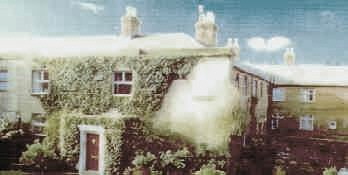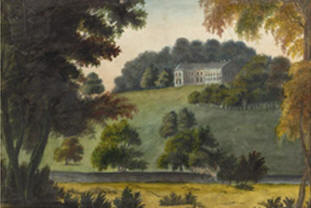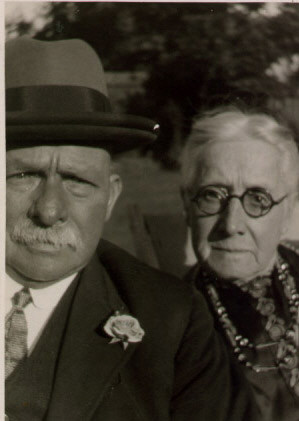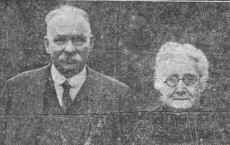HENRY PARKER


Henry Parker was born in Bayston Hill, Condover, Shropshire. His father, Charles, formerly a gardener at Grove House, Abbots Langley (left), the seat of the Earl of Clarendon, was then gardener to the Vicar of Bayston Hill, Robert Hornby, of Lythwood Hall (right). He was married to Elizabeth PHYSICK (b.1826) - daughter of Thomas, a blacksmith, in PRESTON in1852.
Robert Hornby was previously the vicar of Walton-Le-Dale, birthplace of Charles Parker.
On 20 Aug 1873, at the age of 16, Henry became became a premium apprentice
with the Wignall shipping company of Fleetwood, Lancashire.  During
the next four years as an able seaman, Henry had many adventures (see below),
but on the day his indentures were discharged, he left the sea forever and
married 18 year old Elizabeth Wilson. Click on the photo on the left to see his
discharge certificate.
During
the next four years as an able seaman, Henry had many adventures (see below),
but on the day his indentures were discharged, he left the sea forever and
married 18 year old Elizabeth Wilson. Click on the photo on the left to see his
discharge certificate.
Elizabeth Wilson was described by her grandson as being, in old age, very reserved, with badly ulcerated legs, long plaited hair, and a glass eye. Her father was the daughter of a Fleetwood labourer and one-time ferryman. Her family were thought to be Protestants from Ulster with strong Orange connections.
Fireman Henry Parker
Henry was enrolled in the Manchester Fire Brigade on 12th November, 1883. In 1894, he was serving at Upton Street Station, Chorleton-on-Medlock, Manchester, and was promoted to Engineer on 26th November, 1896 at £1.17s.0d. per week.
 On
6th February, 1897 he was involved in an incident at an "eating house"
at 35 Port Street city centre, when he rescued a 2 month old child from the
blazing building; however it later died along with two other persons. For his
efforts, Henry Parker received a letter of recognition and £1 0s.0d. from the
Watch Committee!
On
6th February, 1897 he was involved in an incident at an "eating house"
at 35 Port Street city centre, when he rescued a 2 month old child from the
blazing building; however it later died along with two other persons. For his
efforts, Henry Parker received a letter of recognition and £1 0s.0d. from the
Watch Committee!
On 22nd December, 1904, he was promoted to Third Officer at £2. l0s.0d. per week and retired on 31st December, 1908, with 25 years service. From then until his final retirement following a stroke, he served as fire officer at the Blackpool Tower. Click on here to see more about Manchester Fire Brigade.
 Henry's
son, "Harry", was also a Manchester fireman, and retired as the Chief
Fire Officer of Wilmslow Fire Brigade Click on the
photo on the right to see Harry (on right of photo) with other personnel of the
Wilmslow Fire Brigade, taken outside the Hawthorne Street Fire Station in the
1930s (93KB). The "fire engine" is a 1924 Guy/John Morris pump.
Henry's
son, "Harry", was also a Manchester fireman, and retired as the Chief
Fire Officer of Wilmslow Fire Brigade Click on the
photo on the right to see Harry (on right of photo) with other personnel of the
Wilmslow Fire Brigade, taken outside the Hawthorne Street Fire Station in the
1930s (93KB). The "fire engine" is a 1924 Guy/John Morris pump.


 After
suffering the stroke, he moved to 219 Wragby Rd, Lincoln, to live near his son
Walter. He died of another stroke at the home of his daughter, Lily Timms, at
Folds Crescent, Sheffield. The photos are of Henry and his wife,
Elizabeth
After
suffering the stroke, he moved to 219 Wragby Rd, Lincoln, to live near his son
Walter. He died of another stroke at the home of his daughter, Lily Timms, at
Folds Crescent, Sheffield. The photos are of Henry and his wife,
Elizabeth
Below are two newspaper articles about Henry Parker:
|
FUNERAL OF MR H PARKER Father of a Lincoln councillor Mr Henry Parker of 219, Wragby Road, Lincoln, who died at the home of his daughter at Sheffield, was buried there today. Coun. W Parker, of Lincoln, is his youngest son. Mr Parker has had a very eventful life. He was born at Salop 74 years ago, and in his early youth he was an apprentice in an old windjammer. He crossed the Atlantic many times when the journey occupied weeks instead of days. FIGHT FOR LIFE Mr Parker has travelled to many parts of the world and spent a great deal of time on the east coast of Africa. He claimed to be one of the first men to bring bananas into England, and he would often talk about the time when he first saw them, tasted them, and found how nice they were. He has had many exciting adventures, including attack by a crocodile while crossing a river, and attack by a native armed with a knife. There was a fierce struggle, in which Mr Parker received a knife thrust just under the heart. He recovered from his wound, but always had a scar to remind him of his narrow escape. Mr Parker later joined the Manchester Fire Brigade and rose to the rank of third officer. He was awarded a certificate for bravery in saving life at a fire in the city. One of his sons is chief officer of Wilmslow Fire Brigade. Mr Parker had lived in Wragby Road, Lincoln, for some time, so that he could be near his son, for he has been in failing health for a number of years. He leaves a widow, three daughters (one of whom is in America), and two sons. A third son was reported missing during the Great War. |
|
ROMANTIC
CAREER OF A LINCOLN SEPTUAGENARIAN The Man Who Brought the First Bananas to England From Africa? Some time ago a gentleman in the West Indies created something of a stir by claiming to have found a straight banana. A banana of course is a very familiar object to most of us - yellow and curved, and with a tough skin - but there was a time, and not very long ago, when it was a phenomenon to the majority of English people. Yet the people who introduced this appetising fruit in this country are quite unknown. History belauds Sir Walter Raleigh for his gift of tobacco and potatoes, but no mention is made of Mr. Henry Parker of 2 Austin Walk, St Giles, Lincoln, who claims to be one of the men to first bring bananas - not straight ones, but just the ordinary curved African variety - to England. Remembering that claim, we shall know that when we next slip upon a banana skin, that had it not been for the activities of a fellow citizen it might never have happened! Mr Parker, who celebrates his golden wedding on December 10th, had a number of other interesting things to tell a "Chronicle" reporter who paid a visit to him this week, for in his youth he sailed nearly all over the world in an old wind-jammer, and has had many exciting experiences - in which crocodiles and cannibals have figured prominently - in addition to adventures on the high seas. Mr Parker, who is in his 71st year, is a native of Shrewsbury, and at the age of 13 he joined a barque at Fleetwood, and served his apprenticeship on it. He retains a great love for those sailing ships, and deeply regrets their passing. He laughed when asked how long it took to cross the Atlantic in those days. "Thirty days, perhaps sixty if the weather was bad," he said, "and they can do it in five days now. But there is nothing like sailing ships on longer voyages for comfort and interest. Some were good and some were bad. Of course, I've been on boats that were like hell upon earth, but I've been on others that were just the opposite." One Nigger Less Mr Parker, on one occasion, had a narrow escape from providing a meal for a crocodile. It was while his ship was at Old Calabar on the African Coast. In defiance to orders, he and one or two other members of the crew were swimming near the ship when they were seen by the Captain. He at once shouted to them to come in. They all obeyed immediately, with the exception of a negro member of the crew. Five seconds after they had set foot on the deck, a crocodile made its appearance, and before the negro could reach the ship, it gave just one hearty bite, and there was a vacancy in the crew of one negro, preferably one with a strong (...) to swimming. It was while on the African Coast that Henry Parker met many cannibals. These engaging individuals would come up to one and press one's arm critically with index finger and thumb. Then their faces would break out into huge grins and they would exclaimed, "Good for chop-chop," which really means "You'd make a very tender joint old man, if properly cooked." Plenty Chop-Chop. Their favourite diversion, said Mr Parker, was to make war on a neighbouring village. Starting the proceedings with a dance, to get themselves in the right spirit, they would descend on their neighbours, taking them by surprise if possible. The object of the raid was to take as many persons as possible, but, as can be imagined there was small chance of wizened, tough old natives being taken back. When a good haul had been made, they would go home again, and the real fun of the evening would commence. There would be music and dancing and "chop-chop" in plenty, until not a single prisoner was left. One cannot help thinking, however, how awkward it would be if a hitch occurred, and it was the neighbouring villages who enjoyed the "chop-chop" after the fray. Fell 120 Feet On one occasion, Mr Parker fell from the top-gallant mast, into the sea, a drop of 120 feet. Fortunately the ship was moving slowly at the time, and he was picked up by the crew. Mrs Parker (nee Elizabeth Wilson) who is now in her 69th year, comes from Fleetwood, and it was while there between his voyages that Mr Parker met her. They were married on December 10th 1877, and Mr Parker shortly after joined Manchester Fire Brigade. Incidentally, a week after he had left the sea, his old ship was run down by a liner near Eddystone Lighthouse, and ten members of the crew of 14 were drowned. Mr Parker rose from the ranks in the Fire Brigade to the position of third officer. He then retired and he and Mrs Parker went to live at Blackpool. About three years ago, however, they came to Lincoln to live near the youngest son, Mr Parker, of the new Lincoln motor firm, Messrs Parker, Taylor and Co. They have three daughters, who are living in America, London and Sheffield respectively, and one son is an officer in the Manchester Fire Brigade, while the last was reported missing during the war. There are eleven grandchildren and one great-grandchild. They were married when Mr Parker was 20 and Mrs Parker 18, and in response to a query, "That was rather early, wasn't it?" Mrs Parker replied, "Oh, I don't know. You see there was nothing much else to do in those days. There were no cinemas or theatres, so the only thing to do was to get married." From the Lincolnshire Chronicle 3 Dec 1927 |
